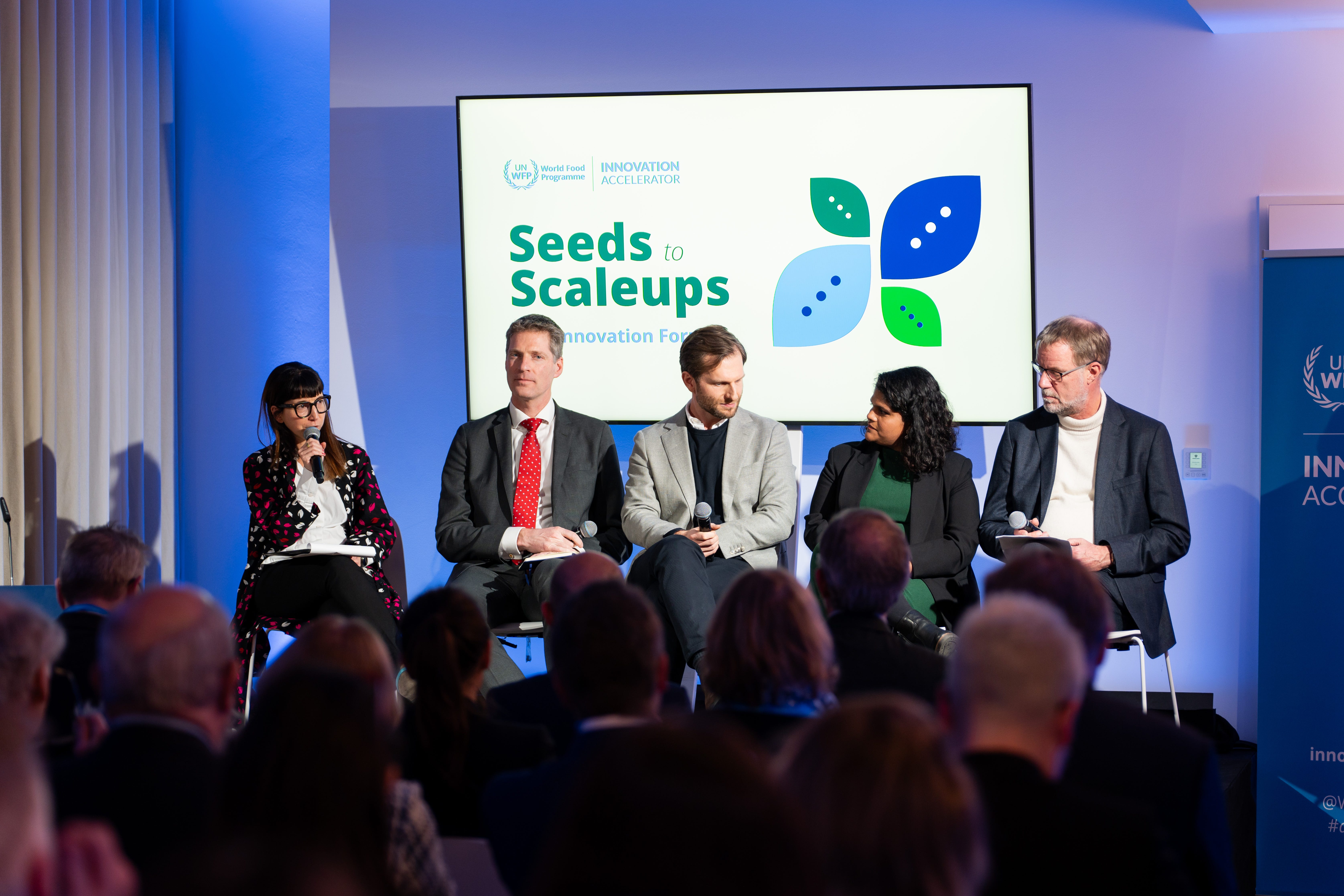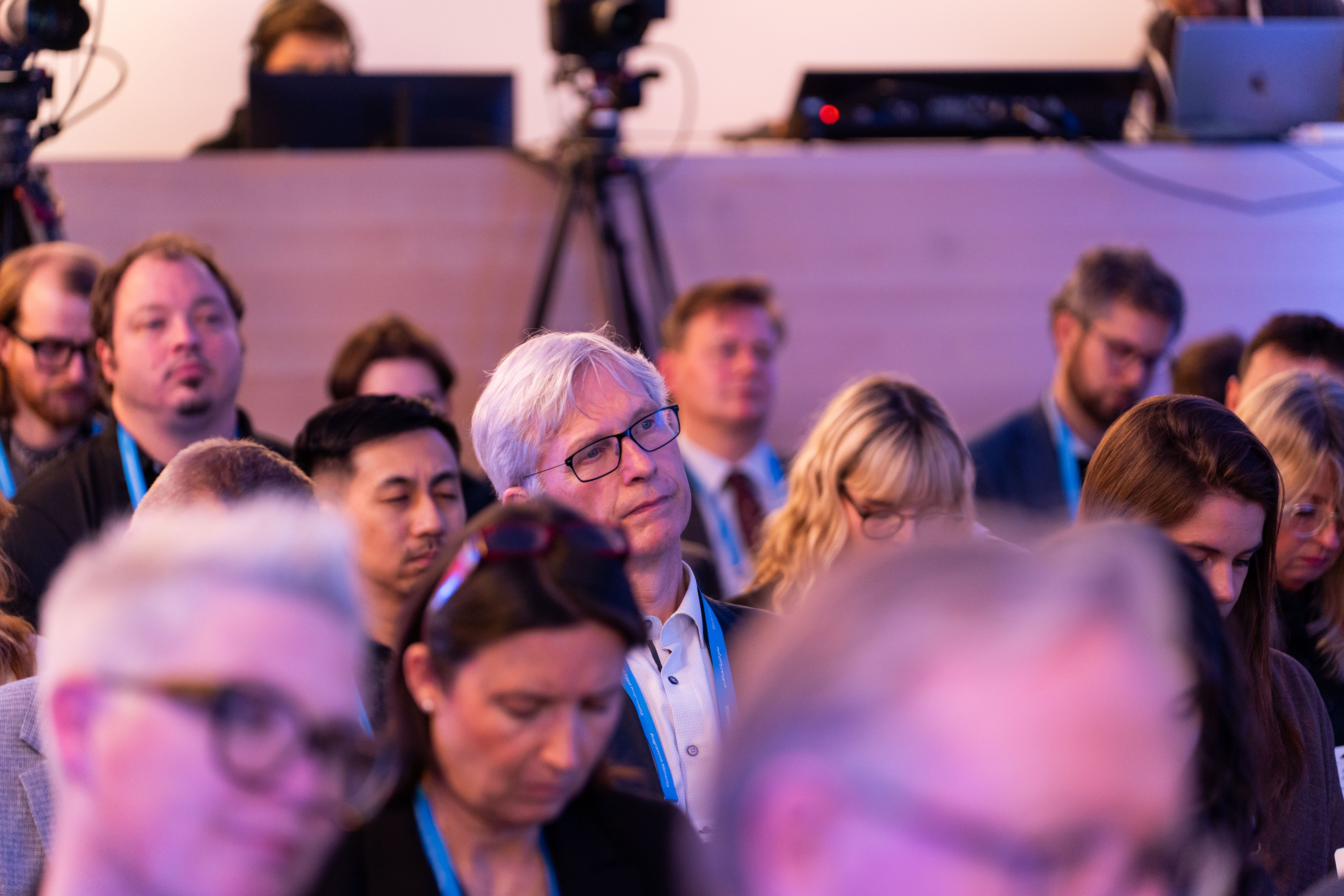Scaling innovation for a hunger-free future: Highlights from the WFP Innovation Forum 2025
By Julia Dalibor
“Globally, 343 million people are severely hungry. Now, more than ever, we need to get creative as we respond to the challenges we face,” said Cindy McCain, Executive Director of the World Food Programme.
As humanitarian needs surge and resources grow increasingly strained, the annual WFP Innovation Forum 2025, held on the sidelines of the Munich Security Conference, spotlighted bold solutions to make every donor dollar count. The goal: ensure food assistance reaches those who need it most, faster and more effectively.
Leading voices from the humanitarian sector, WFP partners, supporters and experts from the public and private sectors gathered at the WFP Innovation Accelerator in Munich. Against the backdrop of more frequent extreme weather events and escalating conflicts, the forum underscored how innovation, efficiency, and modern approaches are indispensable for tackling food insecurity at scale.


“If we want to tackle this, we must build resilience in people against future shocks, while addressing their immediate needs, ” said Axel van Trotsenburg, Senior Managing Director at the World Bank in his video message.
Eight WFP-supported teams presented their cutting-edge ideas, ranging from AI-driven disaster response tools and blockchain-powered aid coordination to sustainable agricultural technologies.
“Food security is a matter of national security. That’s why innovation must be central to global conversations, like those at the Munich Security Conference,” said Bernhard Kowatsch, Head of the WFP Innovation Accelerator, in his opening remarks.
Meet the teams from across the globe who took the stage at the WFP Innovation Forum and explore their groundbreaking solutions below. Together, they’re working toward a future where food assistance is faster, more efficient, and more resilient, leaving no one behind:
Emergency response innovations
The WFP Innovation Forum featured high-impact emergency response solutions that are developed within WFP. These solutions enhance the speed, efficiency and cost-effectiveness of humanitarian aid by leveraging AI, blockchain and financial innovations to streamline disaster response, optimize aid distribution and preposition emergency funding.
SCOUT
SCOUT is a web tool designed to help WFP supply chain officers deliver food more efficiently and effectively. It analyses vast amounts of data and leverages optimization AI to determine the best delivery plan.
By considering factors such as costs, delivery times and storage locations, SCOUT identifies the optimal plan to ensure food reaches the maximum number of people at the lowest possible cost precisely when and where it is needed. In just one year, SCOUT generated $US2 million in cost savings for WFP by planning for a single commodity in one region. Expanding its use across all commodities and all six regions could unlock nearly $US50 million in annual savings.
Building Blocks
Building Blocks is revolutionizing humanitarian aid by driving inter-agency collaboration and ensuring fair, efficient and transparent distribution. Powered by blockchain, it optimizes limited resources to reach those most in need.
Since 2022, the platform has enabled 65 humanitarian organizations to securely coordinate efforts, preventing over US$200 million in unintended aid overlaps. This increased efficiency has freed up resources equivalent to providing an additional 2 million people with a full month of cash assistance, making humanitarian support more effective, equitable and far-reaching.
SKAI
SKAI, developed by WFP in collaboration with Google Research, is an open-source AI tool that rapidly assesses post-disaster building damage using satellite imagery.
By automating damage assessments, SKAI can deliver results in less than 48 hours, up to 13 times faster and at 77 percent lower cost than traditional manual methods, helping responders act swiftly and allocate aid more effectively. With the right access to satellite imagery, SKAI aims to reduce delivery time within 24 hours and support more governments and humanitarian organizations.
To support this, WFP teams are working on integrating SKAI into the DISHA platform, as part of the UN 2.0 initiative that accelerates ethical access to data and AI solutions to enable humanitarian organizations to respond more effectively to crises.
Food Security Cat Bond
In partnership with the World Bank, WFP is pioneering a food security catastrophe (cat) bond to provide rapid financial relief for drought-induced disasters.
Cat bonds shift risk from humanitarian organizations to private investors, ensuring that emergency funds are prepositioned and immediately available when disasters like droughts strike. This initiative is set to unlock US$100 million in funding for Sub-Saharan Africa, making it a UN first in innovative finance for disaster response.
Resilience-building innovations
The Adaptation Fund Climate Innovation Accelerator (AFCIA) fuels groundbreaking ideas that help smallholder farmers and vulnerable communities adapt to extreme weather and become more resilient. AFCIA supports solutions that boost water efficiency, reduce agricultural waste, and enable sustainable food production in challenging environments.
Four teams from AFCIA’s latest cohort took the stage at the forum. After completing a five-day bootcamp at the WFP Innovation Accelerator in November, the innovators now received the chance to present their work on a global platform, connecting them with potential partners and funders eager to support their vision.
P-Vita
P-Vita is tackling agricultural waste in Egypt by transforming 600,000 tons of palm waste into high-value natural extracts for the food and beverage industries.
This circular economy model reduces pollution and increases farmer’s yields by 40 percent, creating sustainable livelihoods in rural communities. With its innovative bioprocessing technology, P-Vita aims to scale operations in the MENA region, further expanding its regional impact.
Partners with Sun
Partners with Sun has created an industrial solar-powered convection oven with hydrogen backup, providing an off-grid alternative for bakeries in crisis-affected regions.
One oven can produce enough bread to feed 15,000 people per day while cutting fuel costs to zero and eliminating one ton of CO₂ emissions daily. In Lebanon, the startup aims to implement their patented innovation with bakeries, potentially impacting 10,000 families, creating 100 new jobs and ensuring communities have access to food even during prolonged energy shortages.
RDI Irrigation
RDI Irrigation offers a breakthrough approach to water efficiency in agriculture. Using plant-responsive technology, it delivers water only when crops need it, reducing water use by 40 percent while increasing yields.
This system, which operates without electricity, is already making an impact, having helped farmers in Iraq double their productivity and expand food production in the Kakuma Refugee Camp in Kenya. A pilot project in Jordan will further test its scalability in arid regions.
Adaptive Symbiotic Technologies
Adaptive Symbiotic Technologies has developed a microbial-based solution that enhances crop resilience to extreme weather. By applying this innovation, farmers can protect their crops from drought, heat, and poor soil conditions.
Trials in India and Ghana have shown remarkable results, with crop yields increasing by more than 100 percent and fertilizer use cut in half. If scaled across Ghana, this solution could reduce grain imports by 27 percent, directly improving food security. With WFP support, the technology is now being piloted in Jordan, with plans to expand across the MENA region.
Charting a path towards lasting impact
The WFP Innovation Forum 2025 left attendees with a shared sense of purpose, underscoring the power of creativity, technology and cooperation to tackle some of humanity’s toughest challenges. Across AI-driven disaster management, microbe-based crop resilience, waste-to-value systems and solar-powered baking, the featured teams showed that bold thinking can yield transformative impact. As humanitarian needs continue to surge, these disruptive ventures, supported by the WFP Innovation Accelerator and a growing coalition of partners, point the way toward more effective, more sustainable food assistance.

Yet, the work has only just begun. By pushing boundaries, forging new cross-sector partnerships and embracing responsible innovation at scale, the World Food Programme and its allies are determined to reach those most at risk.
The lessons shared and solutions showcased at the Forum will be the foundation for even greater collaboration in the months and years ahead. Jochen Flasbarth, State Secretary at the German Federal Ministry for Economic Cooperation and Development (BMZ), captured the urgency of our shared mission:
“The Innovation Forum is a very well-established and appreciated format ahead of the Munich Security Conference, and unfortunately, it is more urgent than maybe ever before.”
His words highlight the critical importance of continued innovation in humanitarian and development assistance. Together, we can deliver on the promise of a hunger-free future, one innovative step at a time.
Missed the event or want to learn more about the innovation teams?
Check out our event webpage.
The WFP Innovation Accelerator sources, supports and scales high-potential solutions to end hunger worldwide. We provide WFP colleagues, entrepreneurs, start-ups, companies, and non-governmental organizations with access to funding, mentorship, hands-on support, and WFP’s global operations.
Find out more about us: http://innovation.wfp.org.
Subscribe to our e-newsletter.
Follow us on Twitter and LinkedIn and watch our videos on YouTube.
